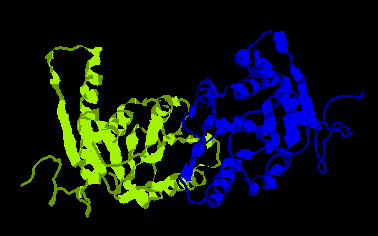 |
 |
 |
Click on the image to start downloading the PDB file (tridimensional and interactive)
GAR transformylase
GART
2-amino-N-ribosylacetamide 5'-phosphate transformylase
GAR formyltransferase
Glycinamide ribonucleotide transformylase
GAR TFase
5,10-methenyltetrahydrofolate:2-amino-N-ribosylacetamide
ribonucleotide transformylase
1.Transferring one-carbon groups
2.Hydroxymethyl-, formyl- and related transferases
5'-P-ribosylglycinamide
5'-P-ribosyl-N-formylglycinamide
Metabolic Pathways
Phosphoribosylglycinamide formyltransferase catalyzes the third step in de novo purine biosynthesis, the transfer of a formyl group to 5'-phosphoribosylglycinamide. In higher eukaryotes, GART is part of a multifunctional enzyme polypeptide that catalyzes three of the steps of purine biosynthesis. In bacteria, plants and yeast, GART is a monofunctional protein of about 200 amino-acid residues.
In the Escherichia coli enzyme, an aspartic acid residue has been shown to be
involved in the catalytic mechanism. The region around this active site
residue is well conserved in GART from prokaryotic and eukaryotic sources and
can be used as a signature pattern.
Reference